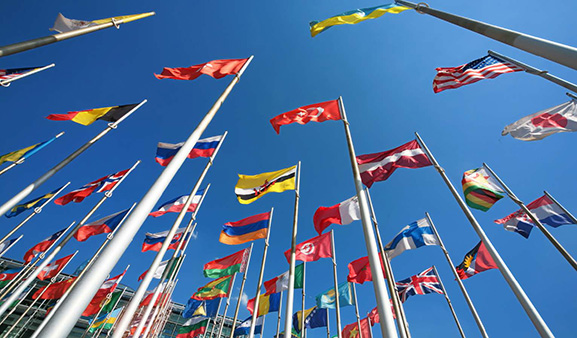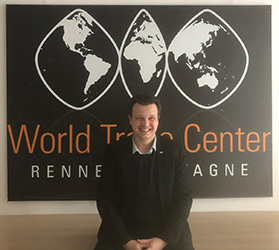Volume 27 | Issue 3
Click here to read the complete illustrated article or continue below to read the text article.
Today’s global economy is undeniably shaped by many geopolitical risks, leading to significant challenges for international trade. Countless companies around the world are faced with increased restrictions, escalating costs, and supply chain disruptions that significantly affect trade on a daily basis. Just this year alone, national elections will be held in countries that represent 54 percent of the world’s population and nearly 60 percent of global GDP, thus engendering even more business regulatory uncertainties.
Trade can be an effective way for securing peace and ensuring global security in our increasingly interconnected world. As far back as the 18th century, Baron de Montesquieu, one of France’s most influential figures during the Enlightenment period, had made his obser vation about commerce as “a cure for the most destructive prejudices.” According to Montesquieu, trade has the capacity to pacify countries’ manners and promote peace. If trading nations become interdependent, they are less likely to fight each other. Commercial relationships build shared interests among partners resulting in better understanding between them through reducing cultural barriers. This concept has been further developed by such thinkers as Immanuel Kant, Richard Cobden, and others, into what emerged as an influential idea most commonly known today as “Peace through Trade.”
Despite the dramatic changes the world has seen since the 18th century (revolutions, colonization, decolonization, world wars, shifting power dynamics, etc.), key international institutions have emerged and thrived. The United Nations, the World Trade Organization and the European Union naturally come to mind. Let’s however focus here on non-political trade organizations like the International Chamber of Commerce Network, the Enterprise Europe Network, or World Trade Centers Association (WTCA), which were created to promote trade, connect businesses globally, and indirectly endorse peace and understanding between nations. These networks aim to improve global cooperation without, or at least very minimal, political agendas. Through these networks, companies gain access to essential resources, market insights, and global business partnerships that help them understand and operate in differing, and sometimes quite complex, markets.
One might say that these trade-focused, non-political networks are an illustration of the ideas of Montesquieu, Kant, Cobden, and other modern thinkers who believed that international trade and regulation are crucial for promoting peace by creating economic interdependence and reducing conflict. Through region-specific risk management workshops, regulatory compliance seminars, matchmaking opportunities, WTCA for instance, and its World Trade Center members, give businesses tools to protect their operations and contribute to sustaining peace through international economic collaboration.
WTCA, as a non-political network, thus plays a key role in maintaining effective trade practices, ensuring operational continuity and promoting international peace.
In today’s interconnected global economy, companies face a multitude of risks that vary greatly depending on the region in which they operate. Tailoring risk mitigation strategies to address these region-specific issues is crucial for long-term success.
Those WTC businesses that provide trade services or host business clubs offer workshops that help businesses understand different markets. These might include cross-cultural training workshops, strategies for entering growing markets like West or Central Africa, or guidelines for navigating trade dealings in South Asia. WTC businesses often work together to provide key insights and contacts, and as a result, matchmaking opportunities between businesses with a higher degree of confidence around the world. For example, the recent workshops held in June and July 2024 between various French WTC businesses and WTC Bengaluru helped companies understand the French and Indian markets and are a perfect illustration of the effectiveness of these activities.
Regulatory environments are also constantly changing across various jurisdictions. Staying agile and compliant with new rules is not just a legal requirement, but also a strategic necessity to avoid operational disruptions.
Effective regulatory navigation involves close collaboration with legal and compliance teams, as well as leveraging technology to track and manage regulatory requirements throughout the life of each trade transaction. By helping businesses understand and comply with new regulations, organizations can reduce the risk of disruptions and maintain a competitive advantage. For instance, WTC Rennes Bretagne collaborates on a regular basis with the Enterprise Europe Network (EEN), which provides legal expertise to help companies understand and comply with regulations. WTC Rennes Bretagne also partners regularly with local and international law firms as well as consultants to assist its members with regulatory issues and inform them of legal evolutions in key markets.

“Alone, I go faster; together, we go further” – African proverb.
In times of uncertainty, strategic alliances and memoranda of understanding can be crucial for businesses facing challenges. These alliances allow companies to pool resources, share knowledge, and reduce risks collectively. During the COVID-19 pandemic, despite travel restrictions, the WTCA community grew closer than ever. WTC businesses around the world sought to create alliances to maintain supply chain continuity, find new markets, and proactively create opportunities for their members.
By forming and nurturing these alliances, WTC businesses and their member-companies built resilience and enhanced WTCA’s ability to help businesses navigate uncertain economic environments. Through its Member Advisory Councils (MAC), WTCA encourages WTC businesses to learn from one another. For example, for the past three years, together with WTC Leeuwarden, WTC Rennes Bretagne hosts a series of webinars in which WTC businesses share best practices or tackle a trade service-related topic to ensure that European, African and Asian WTC businesses receive a comprehensive set of strategies to grow, work together, and connect over WTCA’s core values.
Fostering cross-border partnerships is also crucial for businesses to promote peace and stability, both regionally and globally. Engaging in international collaborations provides companies with opportunities to bridge cultural and economic divides and forge connections that allow regions to share resources, knowledge, and technology, leading to economic growth and peace.
One example is WTCA’s “Francophone Initiative,” which connects French-speaking members from around the globe. This informal group includes members from France, Belgium, Canada, Algeria, Côte d’Ivoire, Madagascar, and beyond, all united by their ability to conduct business in French. This initiative helps overcome linguistic barriers and speeds up business transactions.
Cross-cultural understanding is vital for successful business dealings. That’s why WTC businesses around the world include cross-cultural insights in their workshops, even when the main focus of these workshops is on other specific trade topics like international commerce terms or regulations. For example, WTC Rennes Bretagne, with its partners, conducts 30 to 35 workshops each year that all have a common underlying theme — the importance of cultural competence in business.
WTCA — a network of more than 300 highly connected, mutually supporting businesses and organizations in nearly 100 countries — facilitates global trade and investment worldwide by providing an “international ecosystem” that connects commercial property developers, economic development agencies, and international businesses of all sizes. By connecting its network of WTC businesses, WTCA has provided companies, specifically small- and medium-sized enterprises, with the tools, resources, and connections needed to navigate a wide variety of turbulent times and expand to international markets.
For instance, during Brexit, WTC Rennes Bretagne together with its main founding entity, the Ille-et-Vilaine Chamber of Commerce & Industry, assisted businesses in adapting to new trade regulations and market conditions by offering expert guidance and facilitating cross-border partnerships. Similarly, when economic sanctions were imposed on Iran in 2018 and Russia in 2022, WTC Rennes Bretagne’s network helped companies find alternative markets and secure their operations.
WTCA also hosts several high-impact business networking events around the globe each year for businesses to forge new global connections and alliances, and gain access to resources needed to help their business grow internationally through any season of uncertainty. Upcoming events include the Annual WTCA Member Forum in New York City, from October 27 – 29, 2024 and the Annual WTCA Global Business Forum in Marseille, France, from April 6 – 9, 2025.
Leveraging non-political networks undeniably offers the opportunity for businesses to maintain stability in the face of geopolitical uncertainty and navigate the challenges of global trade while also invertedly fostering peace. In the end, with more mutual understanding and compassion earned through these trade relationships, economies can remain more stabilized and interconnected in prosperous ways.

Nicholas Beaty is the Vice-Chair of the Trade Services Member Advisory Council (MAC) EMEA (Europe, Middle East & Africa) for World Trade Centers Association (WTCA), where he organizes and coordinates events and educational sessions focused on the complex world of international trade, and a Member of the WTCA’s European Regional Advisory Council (RAC). He is also the Manager of World Trade Center (WTC) Rennes Bretagne, a club operated for and created by business leaders working internationally. The club is hosted and supported by the Ille-et-Vilaine Chamber of Commerce & Industry.
Scott Ellyson, CEO of East West Manufacturing, brings decades of global manufacturing and supply chain leadership to the conversation. In this episode, he shares practical insights on scaling operations, navigating complexity, and building resilient manufacturing networks in an increasingly connected world.